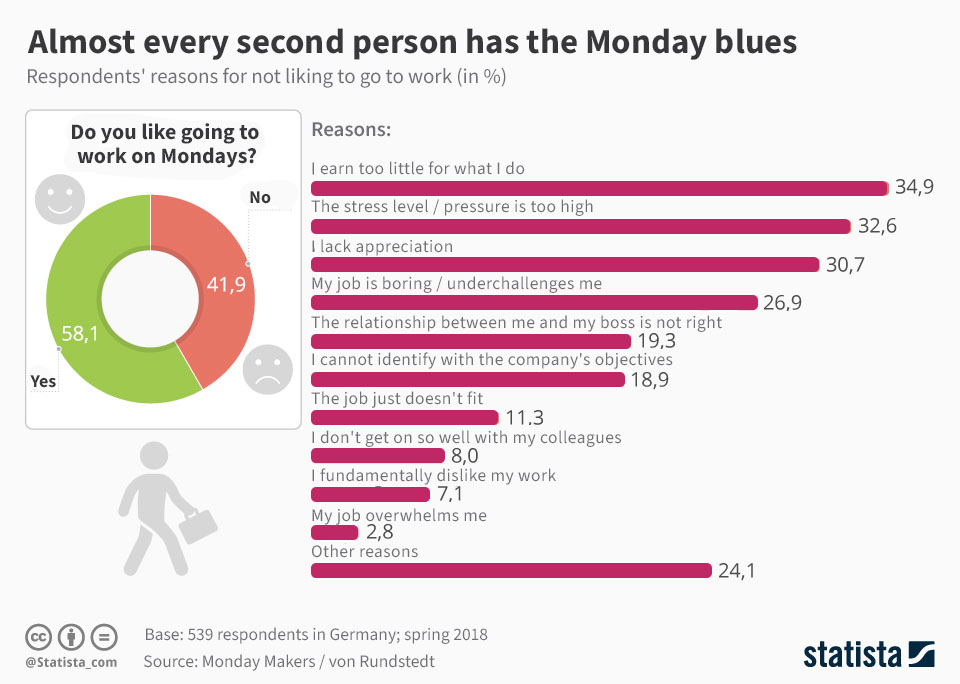

Tips to start the new week motivated
Monday is considered unpopular. Yet every Monday is the perfect opportunity to start the new work week fresh. This article explains how to start a new week motivated and efficient. By the way: If you want to learn more about the topic ‘motivation’, you can find an exciting interview with business coach Sebastian Körber here.
(Why) is Monday actually so unpopular?
A universal answer to this question can hardly be found, because everyone has their own reasons for liking or disliking a day. But the fact is: if we already grow up with parents complaining about the end of the weekend and the beginning of the new week, we automatically learn this attitude. Added to this are factors that make Mondays easier or more difficult. Primarily, this includes enjoying our job. If you enjoy your work and have a good relationship with your colleagues and bosses, you have less difficulty starting the working day.
Another factor is recovering from the previous weekend. If you take on too much on Saturday and Sunday and don’t make sure to use these days as a break from everyday life, you will naturally feel less refreshed and motivated at the end of the weekend.
The following statistics can nevertheless clarify very well what the Monday blues, from which every second person suffers, can be related to:

Last but not least, this also includes a certain daily structure that each of us can put together individually. We have compiled the best tips
Start the day off right with these tips – from Monday to Sunday

Tip 1 – Tomorrow starts already today
Sounds weird, but it is reality. If you want to start the day fit and motivated, you need one thing in particular: enough sleep. A lack of sleep makes you feel exhausted, and you have less energy to get out of bed. The essential recommendation is to sleep about 7-9 hours per night. However, as it depends on the quality as on the length of sleep, it is worth paying attention to your senses and keeping a sleep diary. This allows you to identify which sleeping hours make you feel most comfortable.

Tip 2 – Establishing a morning ritual
Those who go straight from bed to the bathroom, and then straight to their desk to start their work in the morning work don’t have motivational problems but time management difficulties. Anyone who has to rush in the morning to start work on time will not have time to start the morning mindfully with rituals they look forward to after waking up.
How can a morning ritual look like? We have put together a few quick tips:
- Have a tasty breakfast, which you can prepare the day before.
- Brew a fresh cup of coffee or tea.
- Do some exercise, such as yoga, morning walk or any other physical activity.
- Use a favourite scent or vaporize an essential oil. Appropriate scents put you in a good mood and signal the brain to work with focus.
- Listen to a motivating podcast or read an inspiring text every morning.
The important thing when establishing a ritual is always that it fits your personality. Just because other people like to do yoga doesn’t mean it has to be part of a perfect morning. Likewise, if you don’t want to eat in the morning, you don’t have to force yourself to do it. Generally, it takes a few weeks of perseverance to build up the ritual and learn how much time each step takes. Therefore, don’t give up after a couple of days, and keep at it. Someday the flow will come on its own.

Tip 3 – Make a To-Do List
Checking off a to-do list brings more than just happiness it also provides structure to the daily routine. If you get an overview of all the tasks that are due in the coming week on Mondays, you can divide individual tasks among the week’s days and adapt them to meetings, personal needs, etc. The key is to be specific in this case. A task with the title ” Work through emails” is too general. It is preferable to split it up into small tasks such as “Reply to Ms. XY’s mail from 29.01.” On the one hand, this makes it easier to see how many tasks you still have to do, and by breaking them down into small individual tasks, and the other completed tasks can be checked off more frequently. This also boosts motivation.

Tip 4 – Set up the workplace optimally
Do yourself the favour of a clean desk – whether in the office or the home office. Even if you can’t change spatial circumstances, or only to a limited extent, you should be able to arrange your desk the way you feel comfortable. For example, provide enough lighting with a daylight lamp, position an indoor plant and organize your documents every day so that you have a tidy and organized workplace the next morning. After all, if you look directly at an untidy, chaotic desk in the morning, you will quickly lose the enthusiasm to start work at all.

Tip 5 – Give yourself breaks and look forward to them
You work with full dedication – so your mind and body have earned regular breaks. By the way, by a break we don’t just mean the big lunch break, we also mean the short breaks in between. This doesn’t include the distraction of the mailman or a call from a colleague, but rather a deliberate short break in which you can open the window, stretch your legs or drink a coffee. The so-called Pomodoro-Timer is suitable for this purpose. After this period, there is a short break of 5 minutes. Once you have gone through four “Pomodoros”, a long break of 15 minutes follows.
By the way: you can find even more tips for the ideal break planning here.

Tip 6 – Remember why you are doing the job
Despite all the rituals and lists, sometimes you just don’t have the motivation to sit down in front of the PC or go to work. If you are not motivated at all, remind yourself why you are doing this job. Whether it’s the sense of purpose in your work, the cool colleagues or the salary – there’ sure one or more reasons to get going.
This advice applies not only to your job, but also to your private life and individual tasks that you have set yourself.

Tip 7 – Try something new
No, this does not mean a change of sector and the related termination of employment. In fact, it’s quite the opposite. Try to solve a task in a new way at least once a day. You may also discover opportunities to make specific tasks faster, of higher quality, or more efficient. If a new technique has proven successful for you, make it available to your colleagues and superiors. On the one hand, this shows that you care about your job, and on the other hand, the appreciation of your co-workers results in a motivational boost. In addition, the brain is stimulated to form new neuronal connections, which can also influence personal mental performance in everyday life.

Tip 8 – Set deadlines
No matter how comfortable and positive a workday may be, at some point, it’s time to call it a day. Especially those who work in a home office often find it difficult to switch off and finish their work. Be strict with yourself on this: if you set your personal (or predefined) deadline at 6 p.m., stick to it and turn off the PC. Glancing at your mails after dinner should be avoided at all costs, too. You are not doing yourself, your brain or your family any favours by being permanently “on”. Sooner or later, either your body, your soul or your family will show you very clearly that you have crossed a line. This must be prevented to ensure that you can start the day motivated again next Monday morning.
A great blog post from: myhive-offices.com









You must be logged in to post a comment Login